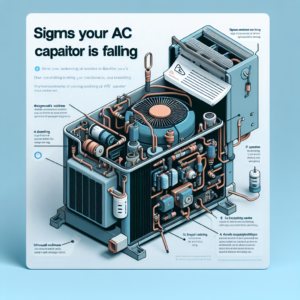Signs Your AC Capacitor is Failing: How to Diagnose the Problem
As the summer heat sets in, ensuring that your air conditioning (AC) system is functioning efficiently becomes crucial. Among various components that contribute to your AC’s operation, the capacitor plays a significant role in the overall performance. However, like any other part of your HVAC system, capacitors can fail over time. In this article, we will discuss the signs your AC capacitor is failing and how to diagnose the problem effectively.
Understanding the Role of the AC Capacitor
Before diving into the symptoms of a failing capacitor, it’s essential to understand what the capacitor does. The AC capacitor stores and releases energy needed to start the compressor and the fan motor. If the capacitor fails, it can lead to inadequate cooling, increased energy costs, or even complete system failure.
Signs Your AC Capacitor is Failing: How to Diagnose the Problem
Recognizing the signs your AC capacitor is failing is the first step toward preventing further damage to your system. Here are some key indicators to watch for:
1. Difficulty Starting the AC Unit
If your AC unit struggles to start or doesn’t start at all, this could be a sign of a failing capacitor. You might hear a humming sound, indicating that power is reaching the unit, but the motor isn’t able to start. This inability to get going is often one of the first signs your AC capacitor is failing.
2. AC Unit Shuts Off Unexpectedly
Another prominent symptom is when your AC unit shuts off unexpectedly after a brief runtime. This interruption can be due to the capacitor failing to provide the necessary voltage to keep the compressor running. If you notice frequent cycling, it’s time to consider that your capacitor may need to be examined.
3. Unusual Noises
Strange noises can signify various issues with your AC, and a failing capacitor is no exception. If you hear clicking, buzzing, or popping, the capacitor may be damaged or unable to hold the charge. Listening for these sounds can help you identify signs your AC capacitor is failing before the issue escalates.
4. Higher Electricity Bills
If your electricity bills have surged without a corresponding increase in usage, it may indicate an inefficient AC system. A faulty capacitor can cause the AC unit to work harder than necessary, leading to increased energy consumption. Monitoring your bills can provide insight into potential electrical inefficiencies.
5. AC Unit Overheating
If your AC unit becomes excessively hot to the touch, it may be suffering from a failing capacitor. This excess heat can be damaging to the compressor and other components in the system. If you notice your outdoor unit overheating, it’s crucial to diagnose the problem immediately.
6. Physical Damage or Leaking
Finally, a visual inspection of the capacitor can reveal notable signs of failure. Look for any bulging, corrosion, or oil leakage around the capacitor. These physical signs typically indicate a serious problem that warrants immediate attention.
How to Diagnose the Problem
If you suspect that your AC capacitor is failing, taking prompt action can save you from costly repairs down the line. Here are steps to diagnose the issue:
1. Turn Off the Power
For your safety, begin by turning off the power to your AC system. This prevents any risk of electrical shock as you conduct your inspection.
2. Check the Capacitor
Using a multimeter, test the capacitor for its capacitance level. Most capacitors have a specified range of capacitance, typically indicated on the label. If your reading falls significantly outside this range, it’s likely time for a replacement.
3. Inspect for Physical Signs
Check the capacitor for any physical damage. Look for bulging ends, rust, or leaking fluid which are clear signs that the capacitor needs to be replaced.
4. Seek Professional Help
If you’re unsure about performing the diagnosis or repair yourself, it’s always wise to consult a professional HVAC technician. They possess the expertise and tools necessary to handle capacitors safely and effectively.
Conclusion
Being aware of the signs your AC capacitor is failing and knowing how to diagnose the problem can help you maintain your cooling system effectively. Regular maintenance and timely diagnosis of issues like a failing capacitor can prolong the life of your AC unit and keep your home comfortable during the hottest months. If you suspect your capacitor is failing, don’t hesitate to take action and consult a professional for the necessary repairs.

